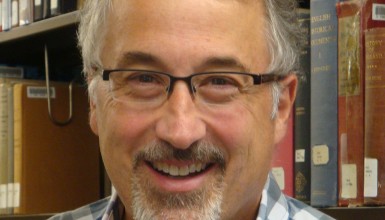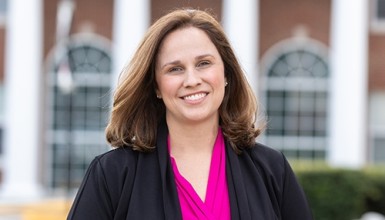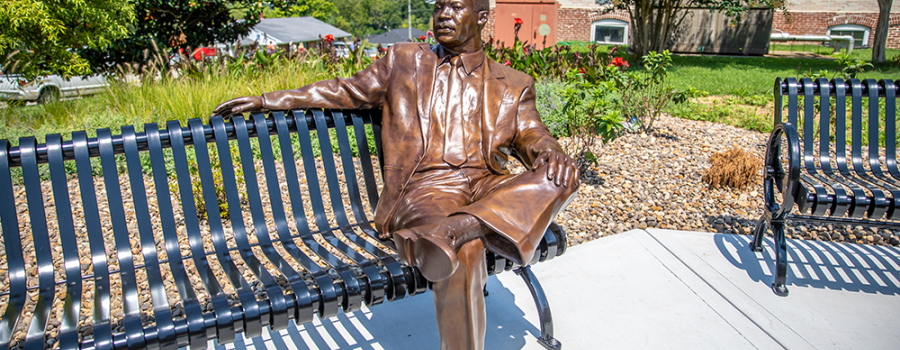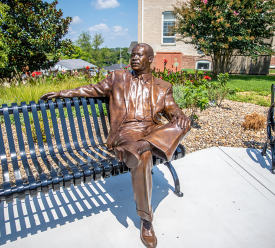Learn how to introduce students to the rich, dynamic world of social studies.
A college degree in history or social studies prepares future history and social studies teachers with the training they need to qualify for licensure and pursue teaching opportunities in high school classrooms. Coursework traditionally covers topics such as world civilization, American history, diplomacy, constitutional origins, and more. If you wish to apply that knowledge to teach in a high school classroom, you should also gain an education in what it takes to help young learners succeed. Through education-oriented classes, you'll cover how to make lesson plans, how to evaluate student progress, how to personalize instruction, and more.
By the Numbers
Programs & Requirements
* The credit hours listed on this page only reference the specific program requirements and is not reflective of the total hours necessary to receive your degree. Cumberlands requires all students obtain a minimum of 60 hours for an associate’s degree and a total of 120 hours for a bachelor’s degree. Transfer and prior learning credits may be counted toward those totals.
To learn more about our General Education Requirements, please visit the page referenced below or explore our Academic Catalog.
Bachelor of Science in Social Studies Education (Secondary Certification)
If your career goal is to introduce students to the rich, dynamic history of the past in order to prepare them for the future, a degree in secondary education with a major in history is the first step toward making that dream a reality. With our experienced, caring faculty here to help you tailor your program of study with the courses that best fit your personal goals, you’ll have opportunities to explore subjects that range from the great cultures of ancient times to the twenty-first century and everywhere else in between. And, as you chart your way through history, you’ll be able to obtain the knowledge and skills necessary for earning your social studies teaching certification for secondary education.
During your 12-week practicum, you will develop invaluable relationships that could lead to future employment. By collaborating with colleagues and supervisors you will have the opportunity to grow professionally and enhance learning communities.
Note:
42 Credit Hours in professional education required.
In order to obtain certification to teach Social Studies in the State of Kentucky, the student must complete 37 Credit Hours in History and 24 Credit Hours in Social Studies. Each Prefix must have at least one course selected.
Course Requirements
A Bachelor of Arts degree requires completing the same courses as a Bachelor of Science with the addition of completing one foreign language sequence through the intermediate level.
- FREN 131 Elementary French I
- FREN 132 Elementary French II
- FREN 231 Intermediate French I
- FREN 232 Intermediate French II
- SPAN 131 Elementary Spanish I
- SPAN 132 Elementary Spanish II
- SPAN 231 Intermediate Spanish I
- SPAN 232 Intermediate Spanish II
BADM 136 and BADM 137 are required courses for the program.
- BADM 136 - Microeconomics
- BADM 137 - Macroeconomics
- POLS 131 - Introduction to Political Science
- POLS 233 - American National Government
- POLS 235 - Introduction to International Relations
- POLS 338 - Comparative Politics
- POLS 433 - Constitutional Law
- SOCI 131 - Introduction to Sociology
- PSYC 333 - Psychology of Personality
- PSYC 334 - Social Psychology
- BADM 436 - Capstone: Global Business
- GEOG 131 - Introduction to Human Geography
- GEOG 231 - Environmental Geography
- SOWK 237 - Human Behavior in the Social Environment
Take the Next Step
Mission & Goals
The purpose of the School of Education is to develop entry level education students into highly qualified, knowledgeable and caring teachers. We provide training and experiences using best practices for teacher education candidates.
Social Studies Education Careers & Outcomes
All stats from U.S. Bureau of Labor Statistics
High School Teacher: $61,820
High School Teacher: $61,820
High school teachers teach academic lessons and various skills that students will need to attend college and to enter the job market.
History Professor: $79,640
History Professor: $79,640
Postsecondary teachers instruct students in a variety of academic subjects beyond the high school level.
Social Science Research Assistant: $50,470
Social Science Research Assistant: $50,470
Assist social scientists in laboratory, survey, and other social science research. May help prepare findings for publication and assist in laboratory analysis, quality control, or data management.
Political Scientist: $122,510
Political Scientist: $122,510
Political scientists study the origin, development, and operation of political systems.
Sociologist: $92,910
Sociologist: $92,910
Sociologists study society and social behavior.
Historian: $63,940
Historian: $63,940
Historians research, analyze, interpret, and write about the past by studying historical documents and sources.
Common Questions
A social studies education degree equips students with knowledge in history and social studies, along with the skills needed to teach these subjects at the secondary school level. It combines coursework in topics like world history and American history with education-focused training in lesson planning, student evaluation, and instructional methods.
A social studies education degree typically takes four years to complete for full-time students, as it requires around 120 total credit hours, including both general education and major-specific courses.
The information provided suggests the degree is primarily on-campus, though some institutions may offer an online version of the degree. It’s best to check with specific schools for online availability.
If you are passionate about teaching and want to help students understand history and social systems, a social studies education degree can be worth it. With an average salary of $61,820 for high school teachers and opportunities to work in diverse educational settings, it can be a rewarding career path.
Graduates with a social studies education degree can become high school teachers, history professors, social science research assistants, political scientists, sociologists, or historians. These roles focus on educating others, conducting research, and analyzing societal trends and historical events.
To get a social studies education degree, you need to apply to a university that offers the program. Once accepted, you’ll complete general education and major-specific courses, as well as fieldwork and teaching practicums to prepare for licensure.
Social studies is the broad study of society, history, politics, and culture. Social studies education focuses on teaching these subjects, specifically training students to become educators who can effectively convey social studies concepts to learners in a classroom setting.
Faculty Experts in Social Studies
Get to know your future social studies professors.

Dr. John D. Wineland

Catherine Ball, JD

Dr. Michael Spurlock
Request Information
Have questions? Ask us! We'll do our best to get back with you soon.

